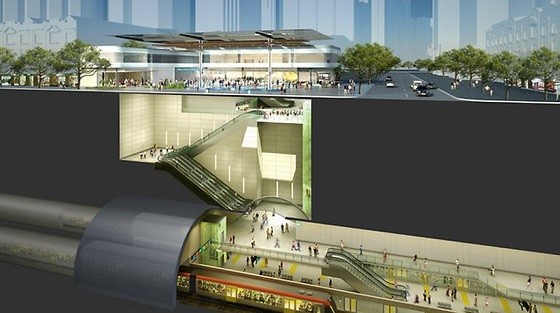
The vast majority of voters probably didn’t even think cities were a political issue until the ascent of Malcolm Turnbull to the office of Prime Minister.
He’s borrowed liberally from Labor’s song book on urbanism but he’s achieved something Labor hasn’t – put cities at the top of the political agenda.
He’s appointed a Minister for Cities and the Built Environment and he’s strongly implied he’ll fund public transport projects like Brisbane Cross River Rail and Melbourne Metro.
Opposition Leader Bill Shorten’s immediate response is to insist Mr Turnbull prove his bona fides by reinstating the $4.5 billion of Commonwealth funding the Opposition alleges the Abbott Government cut from public transport projects.
As I noted last week, one problem with that strategy is the $4.5 billion was notional; it wasn’t a real budgetary commitment (see Where’s the $4.5 billion taken from public transport?).
But that’s the least of the problems with Mr Shorten’s strategy.
The big flaw from the Opposition’s perspective is the Turnbull Government will have no trouble meeting Mr Shorten’s $4.5 billion target.
And when it easily steps over the bar it’ll be able to claim it’s succeeded; it’ll be able to say it’s done enough. (1)
Just as Julia Gillard and Wayne Swan did in the 2013 budget, Malcolm Turnbull and Scott Morrison will undoubtedly promise lashings of funding for rail beyond the time frame of current budgets.
It won’t be hard with the biggest project on the books, Melbourne Metro (it accounts for two thirds of Bill Shorten’s claimed $4.5 billion), because it won’t be finished until around the middle of the next decade; the bulk of the funding won’t be needed until after two Federal elections.
But the issue here is about much more than poor political tactics on the part of the Opposition. It’s also about improving the way our cities work.
A mere $4.5 billion is not much in the context of the level of public transport investment needed in Australian cities. Melbourne Metro alone is estimated to cost up to $11 billion (The Age says the cost is now $12 billion!).
Nor is it an especially large sum in the context of total Commonwealth expenditures on capital works over a time frame of six years and more.
In would be in Mr Shorten’s best interests – and more importantly those of Australian urban dwellers – to promote a much more ambitious definition of “success” for Mr Turnbull and his Government.
There are plenty of major public transport improvements needed in urban areas that’ll collectively require a lot more from the Commonwealth than $4.5 billion. The proposed rail line to Sydney’s second airport is an obvious one.
The challenge for Mr Turnbull and Mr Shorten, though, is to go beyond headline rail projects. They’re attractive politically because they’re shiny and new, but the reality is new urban rail lines are inordinately expensive.
They can only be a small part of what’s needed to equip Australia’s major cities for projected growth (e.g. see Are politicians doing what’s needed to grow our cities?).
There are many other areas of transport where the Commonwealth should make an important contribution, like working with the states to improve signalling, remove level crossings, rebuild old track and, in particular, improve suburban bus services.
It also has an important role to play through its primary responsibility for taxation.
It could, for example, work with the states on alternative revenue policies that enable stamp duty on housing purchases to be significantly reduced or abolished. Then there’s negative gearing, capital gains exemptions, and more.
It could go beyond the mere restoration of indexation and increase the fuel excise in real terms. It could take a harder look at business and work-related tax benefits for cars, and more.
One of the most important actions the Government and/or the Opposition could take would be to redefine the debate on what’s needed for an effective urban policy.
They could lead the states in tackling fundamental problems like the inefficient use of existing infrastructure through, for example, the use of road space rationing mechanisms like congestion pricing (see Are motorways the only answer to traffic congestion?).
Spending $4.5 billion on a few large urban rail projects over six or more years is important and necessary but the challenges presented by cities require much more.
The really important stuff the Commonwealth should do isn’t even mostly about money; it’s about promoting politically difficult but sensible policies.
_________________
-
Some might imagine Mr Turnbull will do huge and wonderful things for cities, but I say they’re suffering Bonnie Tyler Syndrome.








Crikey is committed to hosting lively discussions. Help us keep the conversation useful, interesting and welcoming. We aim to publish comments quickly in the interest of promoting robust conversation, but we’re a small team and we deploy filters to protect against legal risk. Occasionally your comment may be held up while we review, but we’re working as fast as we can to keep the conversation rolling.
The Crikey comment section is members-only content. Please subscribe to leave a comment.
The Crikey comment section is members-only content. Please login to leave a comment.